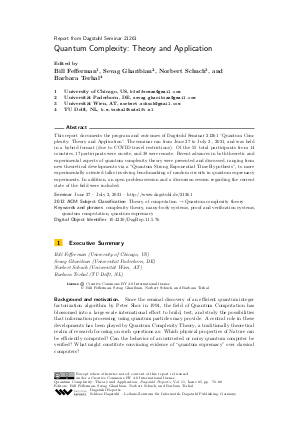Quantum Complexity: Theory and Application (Dagstuhl Seminar 21261)
Authors Bill Fefferman, Sevag Gharibian, Norbert Schuch, Barbara Terhal and all authors of the abstracts in this report
-
Part of:
Issue:
Dagstuhl Reports, Volume 11, Issue 5
Part of: Volume: Dagstuhl Reports, Volume 11
Part of: Journal: Dagstuhl Reports (DagRep) - License:
 Creative Commons Attribution 4.0 International license
Creative Commons Attribution 4.0 International license
- Publication Date: 2021-12-01
File

PDF
DagRep.11.5.76.pdf
- Filesize: 3.06 MB
- 13 pages
Document Identifiers
Subject Classification
ACM Subject Classification
- Theory of computation → Quantum complexity theory
Keywords
- complexity theory
- many-body systems
- proof and verification systems
- quantum computation
- quantum supremacy
Metrics
- Access Statistics
-
Total Accesses (updated on a weekly basis)
0PDF Downloads0Metadata Views
Abstract
This report documents the program and outcomes of Dagstuhl Seminar 21261 "Quantum Complexity: Theory and Application". The seminar ran from June 27 to July 2 , 2021, and was held in a hybrid format (due to COVID travel restrictions). Of the 55 total participants from 14 countries, 17 participants were on-site, and 38 were remote. Recent advances in both theoretic and experimental aspects of quantum complexity theory were presented and discussed, ranging from new theoretical developments via a "Quantum Strong Exponential Time Hypothesis", to more experimentally oriented talks involving benchmarking of random circuits in quantum supremacy experiments. In addition, an open problem session and a discussion session regarding the current state of the field were included.
Cite As Get BibTex
Bill Fefferman, Sevag Gharibian, Norbert Schuch, and Barbara Terhal. Quantum Complexity: Theory and Application (Dagstuhl Seminar 21261). In Dagstuhl Reports, Volume 11, Issue 5, pp. 76-88, Schloss Dagstuhl – Leibniz-Zentrum für Informatik (2021)
https://doi.org/10.4230/DagRep.11.5.76
BibTex
@Article{fefferman_et_al:DagRep.11.5.76,
author = {Fefferman, Bill and Gharibian, Sevag and Schuch, Norbert and Terhal, Barbara},
title = {{Quantum Complexity: Theory and Application (Dagstuhl Seminar 21261)}},
pages = {76--88},
journal = {Dagstuhl Reports},
ISSN = {2192-5283},
year = {2021},
volume = {11},
number = {5},
editor = {Fefferman, Bill and Gharibian, Sevag and Schuch, Norbert and Terhal, Barbara},
publisher = {Schloss Dagstuhl -- Leibniz-Zentrum f{\"u}r Informatik},
address = {Dagstuhl, Germany},
URL = {https://drops.dagstuhl.de/entities/document/10.4230/DagRep.11.5.76},
URN = {urn:nbn:de:0030-drops-155715},
doi = {10.4230/DagRep.11.5.76},
annote = {Keywords: complexity theory, many-body systems, proof and verification systems, quantum computation, quantum supremacy}
}
